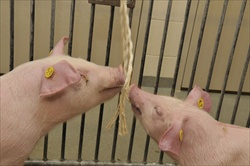Channels
Special Offers & Promotions
Swine Infection Screening Using Oral Fluids
publication date: Apr 26, 2012
|
author/source: Life Technologies
 Large numbers of pigs could be screened more quickly and
cost-effectively for a range of common pathogens, such as PRRSV, SIV and PCV2,
thanks to a new PCR-based test system.
Large numbers of pigs could be screened more quickly and
cost-effectively for a range of common pathogens, such as PRRSV, SIV and PCV2,
thanks to a new PCR-based test system.The system uses samples of oral fluids which can be obtained quickly and easily by leaving a cotton rope in each pen for pigs to chew on. After 20 minutes or so, the rope can be retrieved and the saliva and gingival crevicular fluid squeezed into a sample bag and represents a pooled sample from the group.
Recent studies by researchers from Iowa State University in the US, and biotechnology company Life Technologies, have demonstrated that oral fluid samples collected in this way can form the basis of a quick and cost-effective method for screening for a range of common viral pathogens. The samples were tested using Applied Biosystems sample preparation and real-time PCR test products which are produced by Life Technologies. The system can isolate and identify viral nucleic acid in a matter of hours.
For PRRS, pooled samples of oral fluids were collected from groups of experimentally infected pigs using the rope technique, along with serum samples from each individual pig on the same days. Both serum samples and oral fluids were processed using the same MagMAXTM preparation system and TaqMan® real-time PCR test. The results showed that PRRSV nucleic acid was detectable in both serum and oral fluid samples from the day of infection through to 40 days after infection.
For PCV2, 24 pigs that were free of PRRSV and SIV were divided into 4 pens in separate rooms, and challenged with two different virus strains (PCV2a and PVC2b) at different times. One pen acted as a (non-challenged) control. Oral fluids were collected regularly up to 140 days after initial challenge and tested using real-time PCR. High titres of PCV2 were detected from day 12 to day 28 post infection and virus was detectable throughout the entire testing period (days 2 to 98).
For SIV, a total of 180 spiked oral fluid samples were tested using real-time PCR, and subtyping reagents were also used to identify haemagglutinin and neuraminidase subtypes. The results showed that SIV nucleic acid was detectable in oral fluid samples spiked with high, medium and low copy numbers of SIV, and all positive samples could be successfully sub-typed.
"These results show that the simplicity of oral fluid sampling, combined with the speed and sensitivity of a PCR-based system, provides a practical and cost-effective way of monitoring large numbers of pigs for common virus pathogens," said Christina Boss, European Professional Service Veterinarian for Life Technologies.
"Collecting samples in this way is far less invasive for the pigs and so avoids unnecessary stress. And because all of the pigs will chew on the rope, it provides a very broad sample from the group, which is the key to assessing overall herd health.
"In addition, if the pooled sample provides a positive result, then the animals in that pen can be tested individually to identify those that are infected."
The use of a semi-automated, PCR-based diagnostic system means that nucleic acid purification can be achieved in just 25 minutes and results from the real-time PCR available in 90 minutes. The molecular test is very specific and reliable, so the veterinarian can initiate individual testing as quickly as possible and make confident recommendations to the producer.
Screening for PRRS using samples of oral fluids has been gaining popularity over recent years because large numbers of pigs can be tested without increased cost or labour. The new research is due to be presented as a poster at the ESPHM meeting in Bruges in April.
For more information on how we are making a difference, please visit our website: www.lifetechnologies.com.
About Life Technologies
Life Technologies Corporation (NASDAQ: LIFE) is a global biotechnology company dedicated to improving the human condition. Our systems, consumables and services enable researchers to accelerate scientific and medical advancements that make life even better. Life Technologies customers do their work across the biological spectrum, working to advance the fields of discovery and translational research, molecular medicine, stem cell-based therapies, food safety and animal health, and 21st century forensics. The company manufactures both molecular diagnostic and research use only products. Life Technologies' industry-leading brands are found in nearly every life sciences lab in the world and include innovative instrument systems under the Applied Biosystems and Ion Torrent names, as well as, the broadest range of reagents with its Invitrogen, GIBCO, Ambion, Molecular Probes and TaqMan® products. Life Technologies had sales of $3.7 billion in 2011, employs approximately 10,400 people, has a presence in approximately 160 countries, and possesses one of the largest intellectual property estates in the life sciences industry, with approximately 4,000 patents and exclusive licenses.
Media Partners


